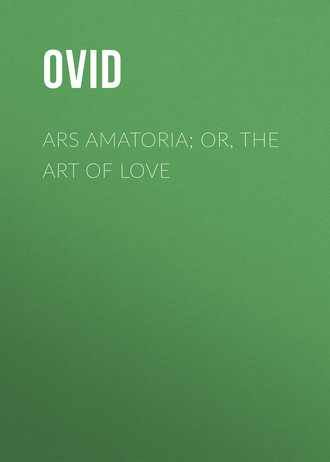 полная версия
полная версияArs Amatoria; or, The Art Of Love
Minos had obstructed all means of escape to the stranger. He discovered a bold path 904 with his wings. When Dædalus had enclosed the man half-bull, and the bull half-man, that was conceived in the criminality of his mother; he said, "Most just Minos, let there be a termination of my exile; and let my paternal land receive my ashes. And since, harassed by the cruel Destinies, I cannot live in my country, let me be enabled to die. If the merits of an old man are but small, grant a return to this boy; if thou art unwilling to favour the boy, then favour the old man." This he said: but both this and many more things he might have said; the other did not permit a return to the hero. Soon as he saw this, he said, "Now, O now, Dædalus, thou hast a subject, upon which thou mayst prove ingenious. Lo! Minos possesses the land, and he possesses the ocean; neither earth nor water is open for our escape; there remains a path through the heavens; through the heavens will we attempt to go. Jupiter on high, grant pardon to my design. I do not aim to reach the starry abodes; there is no way but this one, by which I may escape the tyrant. Should a road through Styx be granted; then we will swim through the Stygian waves; let the laws of nature be changed by me." Misfortunes often sharpen the genius; who could have ever believed, that a mortal could attempt the paths of the air?
He arranges swift feathers in order, like oars, 905 and connects the light work with fastenings of thread; the lower part, too, is bound together with wax, melted by the fire; and now the work of the new contrivance is finished. The smiling boy handles both the wax and the feathers, not knowing that these instruments are prepared for his own shoulders. To him his father says: "With these ships must we reach our native land; by these means must we escape from Minos. The air Minos could not, all else he has, shut against us. Cleave the air, which still thou mayst, with these my inventions. But neither the virgin of Tegeæa, nor the sword-bearing Orion, 906 the companion of Bootes, will have to be beheld by thee. Follow me with the wings given to thee: I will go before on the way. Be it thy care to follow; me thy leader, thou wilt he safe. But if we shall go through the air of the heavens, the sun close to us, the wax will not be able to endure the heat. If we shall wave our wings below, the sea near to us, the fluttering feathers will be wet with the ocean spray. Fly between them both; dread, too, the winds, my son; and whichever way the breezes shall blow, set thy prospering sails."
While he thus advises; he fits his work on to the boy, and shows how it is to be moved; just as their mother teaches the helpless birds. Then he places upon his shoulders the wings made for himself; and with timidity he poises his body along this new track. And now about to fly, he gives kisses to his little son; and the cheeks of the father do not withhold their tears. There is a hill, less than a mountain, more lofty than the level plain; hence are their two bodies entrusted to their mournful flight. Dædalus both moves his own wings himself, and looks back on those of his son; and he ever keeps on his own course. And now this unusual path delights him, and, fear laid aside, Icarus flies more courageously with emboldened skill. A person sees them, while he is angling 907 for fish with his quivering rod, and his right hand desists from the work he has commenced. Now Samos and Naxos had been left behind, on the left hand, and Paros, and Delos beloved by the Clarian God. 908 Lebynthos was to the right, and Calymne 909 shaded with its woods, and Astypalæa, 910 surrounded with its fishy shallows; when the boy, too venturesome in his inconsiderate daring, took a higher flight, and forsook his guide.
The fastenings give way; and the wax melts, the Divinity being so near; and his arms, when moved, no longer catch the light breeze. Alarmed, he looks down upon the sea from the lofty heavens; darkness, arising from trembling apprehension, comes over his eyes. The wax has now melted; he waves his bare arms, and he trembles, and has no means whereby to be supported. Downward he falls; and as he falls, he cries, "Father! O father! I am undone!" As he spoke, the azure waves closed his mouth. But the unhappy father, a father now no longer, cried aloud, "Icarus, where art thou? Or under what part of the sky dost thou fly?"
"Icarus," again he cried aloud; his feathers he beheld in the waves. The dry land covers his bones; the sea retains his name.
Minos could not restrain the wings of a mortal; I myself am attempting to arrest a winged Divinity. If any one has recourse to the Hæmonian arts, and gives that which he has torn from the forehead of the young horse, 911 he is mistaken. The herbs of Medea will not cause love to endure; nor yet the Marsian spells 912 mingled with the magic notes. The Phasian damsel would have retained the son of Æson, Circe Ulysses, if love could only have been preserved through incantations. Philtres, too, causing paleness, 913 are of no use when administered to the fair. Philtres injure the intellect, and have a maddening effect. Afar be all criminal attempts; to be loved, be worthy to be loved; a property which comeliness, or beauty alone, will not confer upon you. Though you should be Nireus, 914 be praised by ancient Homer, and the charming Hylas, 915 carried off by the criminality of the Naiads; that you may retain your mistress, and not have to wonder that you are deserted, add the endowments of the mind to the advantages of the person. Beauty is a fleeting advantage; and the more it increases in years, the less it becomes, and, itself, is consumed by length of time.
Neither the violets nor the opening lilies bloom for ever; and, the roses lost, the thorny bush is prickly left behind. And, handsome man, soon shall come to you the hoary locks; soon shall come the wrinkles, to furrow your body over. Now form a disposition which may be lasting, and add it to your beauty; that alone endures to the closing pile. And be it no light care to cultivate the mind with the liberal arts, and to learn thoroughly the two languages, the Latin and the Greek. Ulysses was not handsome, but he was fluent; and yet with love he racked the ocean Goddesses. 916 Ah! how oft did Calypso grieve at his hastening to depart, and declare that the waves were not favorable to his oars! Again and again did she enquire into the catastrophe of Troy. Often in another manner was he wont to repeat the same thing. On the shore they were standing; even there did the beauteous Calypso enquire about the blood-stained death of the Odrysian chief.
With a little stick, for by chance he was holding a stick, he depicted on the firm shore the subject on which she was enquiring. "This is Troy," said he; and the walls he drew on the shore; "This must be Simois for thee, and suppose these to be my tents. There was a plain," and here he drew the plain, "which we moistened with the blood of Dolon, 917 while, as a spy, he was longing for the Hæmonian horses. 918 There were the tents of the Sithonian Rhesus; in this direction was I borne back again by the captured steeds." And many other things was he depicting, when the waves suddenly carried off both Pergamus and the tents of Rhesus together with their chief. Then the Goddess said, "Dost thou behold how famous names these waves have swept away, which thou dost trust will be favorable to thee about to depart?"
Come then, with hesitation, feel confidence in beauty so deceiving, whoever you are; or else possess something of more value than comeliness. A beseeming courtesy especially enlists the feelings; rudeness and harsh language promote hatred. We dislike the hawk, because it is always living in warfare; the wolves too, that are wont to rush upon the startled flocks. But the swallow, because it is gentle, is exempt from the snares of men; and the Chaonian bird 919 has the turrets for it to inhabit.
Afar lie all strife and contentions of the abusive tongue; with sweet words must gentle love be cherished. With strife let both wives persecute their husbands, and husbands their wives; and, each in their turn, let them ever be thinking that they must resort to law. 920 This is the part of wives; strife is the dowry of the wife. Let the mistress ever hear the accents that she longs for. At the bidding of no law have you come to live together; in your case 'tis love that performs the duties of the law. Bring soft caresses, and words that delight the ear, that she may ever be joyous at your approach.
I do not come as the instructor of the wealthy in Love; he who makes presents has no need of my experience. He who says, whenever he pleases, "Accept this," has a genius of his own. To him do I yield: he has greater attractions than have any discoveries of mine. I am the instructor of the poor, because, as a poor man, I have been in love. When I could not give presents, I gave verses. 921 Let the poor man love with caution, let the poor man stand in fear of bad language, and let him put up with many a thing, not to be endured by the rich.
I remember that once, when in a rage, I disarranged the hair of my mistress; of how many a day did that anger deprive me! I do not think I did, and I did not see that I had, torn her tunic, but she said so, and at my cost it was replaced. But you who are wise, avoid the errors of your instructor; and stand in awe of the punishment of my transgressions.
Let battles be with the Parthians, but be there peace with your refined mistress; mirth too, and whatever besides contains a reason for love. If she is not sufficiently kind or affable to you her lover; have patience, and bear it; after a time she will be softened. By giving way the supple branch is bent from the tree; if you make trial of your strength, you break it. By giving way the waves are swam across; but you cannot overcome the stream if you swim against the flood which the tide carries down. 'Tis yielding that subdues the tigers and the Numidian lions. By degrees only does the bull submit to the rustic plough. What was there more coy than Atalanta of Nonacris? 922 Yet, untamed as she was, she yielded to the deserving qualities of a man. They say that many a time, beneath the trees, Milanion wept at his mishaps, and the unkind conduct of the fair one. Full oft on his neck, as ordered, did he bear the treacherous toils; full oft with his cruel spear did he transfix the savage boars. Wounded, too, he experienced the stretched bow of Hylæus; 923 but yet there was another bow still more felt than this.
I do not bid you, in arms, to climb the woods of Mænalus, and I do not bid you to carry the toils upon your neck. Nor yet do I bid you to expose your breast to the discharged arrows. The requirements of my skill will be but light to the careful man. Yield to her when opposing; by yielding, you will come off victorious. Only take care to perform the part which she shall bid you. What she blames, do you blame; whatever she approves, do you approve; what she says, do you say; what she denies, do you deny. Does she smile, do you smile; if she weeps, do you remember to weep. Let her prescribe the law for the regulation of your features. If she plays, and throws the ivory cubes 924 with her hand, do you throw unsuccessfully, do you make bad moves 925 to the throws; or if you are throwing 926 the dice, let not the penalty attend upon her losing; take care that losing throws often befall yourself, if your piece is moving at the game that imitates 927 the tactics of war, take care that your man falls before his enemy of glass. Do you yourself hold the screen 928 stretched out by its ribs; do you make room in the crowd the way that she is going. And do not delay to place the footstool before the tasteful, couch; 929 and take off or put on the sandals for her delicate feet. Often, too, must the hand of your mistress, when cold, be made warm in your bosom, though you yourself should shiver in consequence. And think it no disgrace (although it should be a disgrace to you, still it will give pleasure), to hold the looking-glass 930 with the hand of a free-born man.
He who, by killing the monsters of his wearied step-mother, earned those heavens which before he had supported, is believed, amid the Ionian girls, to have held the work-basket, 931 and to have wrought the rough wool. The Tirynthian hero was obedient to the commands of his mistress. Go then, and hesitate to endure what he submitted to. When bidden to come to the Forum, take care always to be there before the appointed time; and do not go away until a late hour. Does she appoint to meet you at any place; put off everything else: run quickly, and let not the crowd stop your purposed route. Is she returning home at night, after having been at a feast; then, too, if she calls, come to her as though a servant. 932 If you are in the country and she says, "Come," (love hates the tardy) if a vehicle 933 is not at hand, go your journey on foot. Let neither bad weather nor the parching Dog-star detain you, nor the road made white with the snow that lies there.
Love is a kind of warfare; cowards, avaunt! These are not the standards to be defended by timid men. In this tender warfare, night, and wintry storms, and long journies, and cruel pain, and every kind of toil, have their part. Many a time will you have to endure the rain pouring from the clouds of heaven; cold and on the bare ground full oft will you lie. Cynthius 934 said to have fed the cows of Admetus of Pheræ, and to have lived in an humble cottage. What was becoming to Phoebus, to whom is it not becoming? Away with all conceit, whoever you are, who have a care for a lasting passion. If access is denied you by a safe and smooth path; and if her door shall be fastened by the bar put up; then, do you slip straight down through the open roof 935 let the high window, 936 too, present a secret passage. She will be pleased when she knows that she has proved the cause of risk to you. This will be to your mistress a pledge of your unvarying love. Full oft, Leander, couldst thou have done without thy mistress; that she might know thy passion, thou didst swim across.
And be not ashamed to make her handmaids, as each one is superior in rank, nor yet her male servants, entirely your own. Salute them each by name, there will be nothing thrown away: press their humble hands, proud lover, with your own. Moreover, (the expense is but trifling) give to the servant who asks, some little present from your means. Make a present, too, to the handmaid, on the day on which 937 the Gallic army, deceived by the garments of the matrons, received retribution. Follow my advice, and make the lower classes 938 your own; in that number let there always be the porter, and him who lies before the door of her chamber. And I do not bid you present to your mistress any costly gift; give her moderate ones, but, in your discrimination, well selected from those that are moderate. While the country is abundantly rich in produce, while the branches are bending beneath their load, let the boy bring your gifts from the country in his basket. You may say that they have been sent by you from your suburban retreat, although they may have been bought even in the Sacred Street. 939 Let him carry either grapes, or what Amaryllis was so fond of; 940 but, at the present day, she is fond of chesnuts no longer. And, besides, both with a thrush and a pigeon, 941 sent as a present, you may show how attentive you are to your mistress. By these means 942 are the expectations of death, and solitary old age, disgracefully made matter of purchase. Oh! may they perish through whom gifts promote criminal objects!
Why should I recommend you to send tender lines as well? Alas! poetry does not 943 gain much honour. Verses are praised: but 'tis costly gifts that are sought. If he is only rich, 944 a very barbarian is pleasing. Truly is this the golden age; the greatest honours accrue through gold; love is purchased with gold. Though thou thyself, Homer, shouldst come, attended by the Muses; if thou shouldst bring nothing with thee, thou wouldst be turned out of doors.
And yet there are the learned fair, a very limited number; another set are not learned, but they wish to be so. Both kinds may be praised in verse; the reader may set off the lines of whatever quality by a melodious voice. Indeed, a poem, carefully composed in their honour, will be to these or to those, as good, perhaps, as a little present. But take care that whatever you are about to do of your own accord and consider convenient, your mistress shall always first ask that of you. Has freedom been promised to any one of your slaves; still cause him to make a request for it of your mistress. If you forgive punishment and cruel fetters to your slave, let her be indebted to you for what you were about to do. Let the advantage be your own; let the credit be given to your mistress. Suffer no loss yourself, and let her act the part of the person in power.
But whosoever you are who have a care to retain the fair, cause her to believe that you are enchanted with her beauty. If she is in Tyrian costume, praise the dress of Tyrian hue; 945 if she is in that of Cos, 946 consider the Coan habit as becoming. Is she arrayed in gold, let her be more precious in your eyes than gold itself: if she wears a dress of felt, 947 praise the felt dress that she wears. Does she stand before you in her tunic, exclaim, "You are setting me on fire;" 948 but entreat her, with a voice of anxiety, to beware of the cold. Is the parting of her hair nicely arranged; praise the parting of it; has she curled her hair by aid of the fire: curled locks, do you prove the attraction. As she dances, admire her arms, her voice as she sings; and use the words of one complaining because she has left off. Her very embraces 949 you may commend, on the points that please yourself; and with murmuring accents you may signify your delight. Though she be more fierce than the grim Medusa; to her lover she will become gentle and kind.
Only, take you care that you be not discovered to be a deceiver in these expressions; and by your looks do not contradict your words. If devices are concealed, they are of use; when discovered, they cause shame, and deservedly remove confidence for all future time. Often, at the approach of autumn (when the year is most beauteous, and the filled grape is growing red with its purple juice; at the time when at one moment we are chilled with cold, at another we are melted with heat), through the varying temperature a languor takes possession of the body. She, indeed, may be in good health; but if, through illness she keeps her bed, and, ailing, feels the bad effects of the weather, then let your love and affection be proved to the fair; then sow, that hereafter with the sickle of abundance you may reap. Let no disgust at her malady, that renders her so cross, come upon you: by your hands too, let whatever she will permit, be done. And let her see you as you weep; and be not tired of giving her kisses; and with her parched lips let her dry up your tears. Make many a vow for her cure, but all before her: and as often as she will permit, be seeing pleasant visions to tell her of. Let the old woman come, 950 too, to purify her couch and chamber; and in her palsied hand let her carry before her the sulphur and the eggs. In all these things there will be traces of a pleasing attention; for many a one has this road proved a path to another man's will. But still, let not loathing on the part of the sick fair be the result of your officiousness; let there be certain limits shown in your careful attentiveness. Do not you forbid her food, nor administer the cups with the bitter draught; let your rival mingle those.
But when you have gained the open sea, you must not use the breeze to which you set your sails from off the shore. While Love is wandering in his youth, let him gain strength by habit; if you nurse him well, in time he will be strong. Him that you fear as a bull, as a calf you were wont to pat; the tree under which you are now reclining, was once a twig. A river at its rise is small, but it acquires strength in its course; and where it runs, it now receives many a stream. Make her become used to you; there is nothing more powerful than habit. While you are courting her, avoid no amount of trouble. Let her be always seeing you; let her be always lending ear to you; let both night and day show your countenance. When you have a greater confidence that you may be missed; then, destined to be her care when absent, go away to a distance. Give yourself some repose; the land that has lain fallow, gives back in abundance what has been entrusted to it; and the dry ground sucks up the water of the heavens. Demophoôn, when present, inflamed Phyllis in a less degree; when he had set sail, more violently did she burn. The crafty Ulysses, by his absence, tortured Penelope: far away, tearful Laodamia, was thy hero of Phylace.
But a short respite alone is safe; in time, cares become modified, and the absent love decays and a new one makes its entrance. While Menelaus was absent, Helen, that she might not lie alone, was received at night into the warm bosom of his guest. What meant, Menelaus, this stupidity of thine? Thou didst go away alone; under the same roof were both the stranger and thy wife. And dost thou entrust, madman, the timid doves to the hawk? Dost thou entrust the well-filled sheep-fold to the mountain wolf? Helen commits no sin; this paramour of hers does no wrong; he does what thou, what any one, would do. Thou dost persuade them to adultery, by giving both time and opportunity. What advice, but thine own, has the fair made use of? What is she to do? Her husband is away, and a guest, no repulsive person, is present, and she is afraid to sleep alone in an empty couch. Let the son of Atreus think better of it: I acquit Helen of criminality; she made use of the opportunity given by an easy husband.
But neither is the tawny boar so fierce in the midst of his rage, when he hurls the furious dogs with the lightning shock of his tusks; nor the lioness, when she is giving the breast to her sucking whelps; nor the little viper, when inhired by the heedless foot; as the woman, who is furious on detecting the rival of her nuptial couch, and bears on her features the proofs of her feelings. To the sword and to flames does she resort; and, shame laid aside, onward she is impelled, as though struck by the horns of the Aonian God. The barbarian fair one of Phasis avenged the fault of her husband, and the violated rights of a wife, by the death of her sons. See, how another cruel parent ('tis the swallow that you behold) has her breast stained with blood. 'Tis this breaks those attachments that are firmly united, this, those of long duration; these faults must then be guarded against by cautious men.
But still, my judgment does not condemn you to one fair alone. The Gods forbid! hardly can the married woman adhere to this. Disport yourself; but let your faultiness be concealed by a decent stealthiness. No glory must be sought in one's own delinquency. And do you give no present of which the other may know; nor be there any stated times for your intriguing. And, lest the fair one should catch you in the retreat so well known to her, all must not be met in the same place of rendezvous. And, as often as you shall be writing, do you first examine the whole of the tablet; many a woman reads more than what has been sent to her. A slighted passion brandishes the arms of retribution, and hurls back the weapon, and causes yourself to complain of that of which it complained so lately.
So long as the son of Atreus was content with one woman, she, too, was chaste; through the fault of her husband did she become culpable. She had heard how that Chryses, bearing in his hand the laurel and the fillets, had not prevailed in behalf of his daughter. She had heard, too, ravished one of Lyrnesus, of thy sorrows; and how the warfare had been protracted through disgraceful delays. Still, these things she had only heard of; the daughter of Priam, herself, she had seen. Thou, the conqueror, wast the disgraced captive of thy own captive. Then did she receive the son of Thyestes, both into her chamber and her affections; and the daughter of Tyndarus avenged herself on a husband so deeply criminal.
Your actions, which you have studiously concealed, if perchance any of them are discovered, although they should be notorious, still do you always deny them. On such occasions, do you neither be subdued, nor more kind than usual. That bears the marks of a mind that has too deeply offended. Still, spare not any endearments on your side; peace is entirely centred in caresses alone; by these must the former intrigue be disavowed. There are some who would recommend you to use injurious herbs, such as savory; in my opinion they are so many poisons. Or else, they mingle pepper with the seed of the stinging nettle; 952 and the yellow camomile pounded in old wine. But the Goddess, whom the lofty Eryx receives beneath his shady hill, does not allow us to be impelled in such manner to her delights. The white onion 953 which is sent from the Pelasgian city of Alcathoiis, 954 and the salacious herbs which come out of the gardens, and eggs may be eaten; the honey of Hymettus may be eaten, and the nuts which the pine-tree with its sharp leaves produces.









